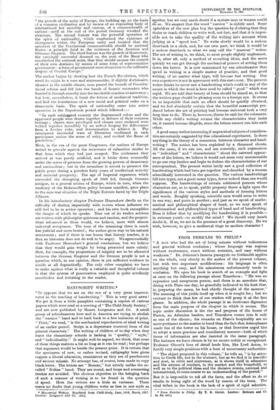MANUSCRIPT WRITING.*
"Jr appears that we are on the eve of a very great improve. meet in the teaching of handwriting." This is very good news ! We get it from a little pamphlet containing a reprint of various papers which were read at a meeting of "The Clnild•Study Society," and are now published by Masers. Longman', and Co. A small group of schoolmasters here and in America are trying to abolish the " cursive " hand and to hark back to a free imitation of print. " Print," we read, " is the mechanical reproduction of ideal writing of an earlier period. Script is a degenerate (elusive) form of the minted characters." The writing of children of to-day when they leave the elementary schools is looking in " quality," " style," and " individuality." It might well be argued, we think, that none of these things matters a bit so long as it can be read ; but perhaps that argument would be beside the present point. It is certain that the specimens of new, or rather revised, calligraphy here given suggest a liberal education, reminiscent as they are of parchments and ancient missals. No attempt has, of course, been made to copy black-letter. The letters are " Roman," but utterly unlike the so- called " Italian " hand. They are round, and loops and connecting strokes are avoided. The obvious objection to the bringing back of such a manner of writing is to be found in the question of speed. Here the writers are a little at variance. There seems no doubt that young children write as fast in one style se • dlonnek'pt Writing. Reprinted from Child-Study, June, tell, March, 1517. Loudon: Longman., and Co. ind.l another, but we very much doubt if a mature man or woman could do so. We suspect that the word "cursive " is rightly used. Some upholders of the new plan beg the question by declaring that they desire to teach children to write well, not fast, and that it is impos- sible not to take the quality of the writing into account when judging at a " speed test." To write slowly would be a serious drawback to a clerk, and, for our own part, we think it would be a serious drawback to what we may call the " amateur " writer. The act of writing is, we think, to most people slightly unpleasant. It is, after all, only a method of recording ideas, and the more quickly we can get through the mechanical process of setting them down the bettor. It is now maintained by one schoolmaster that speed in writing is a simple matter of practice, and that good writing, of no matter what type, will become fast writing. Our own experience is not ill agreement with this statement. The present writer thinks he never saw a handwriting which could in any of the senses in which the word is here used be called " good " which was rapid. Wo aro told that beauty of form should be aimed at, so that the written page should be pleasing even to a foreign eye. It seems to us impossible that such an effect should be quickly obtained, and we fool absolutely certain that the beautiful manuscript pro- duced before the art of printing had become universal took a very long time to do. There is, however, this to be said for the reformers. While any child's writing retains the characteristics they insist on, it cannot become illegible, since the letters cannot run into ouch other.
A good many rather interesting if Impractical subjects of considera- tion are certainly suggested by this educational experiment. Is there anything in the theory of a connexion between character and hand- writing ? The notion has been exploited by a thousand cheats. All the same, if we can use, and use correctly, such expressions as " individual " and " characteristic " about the outward appear- ance of the letters, wo believe it would not seem very unreasonable to go one step further and begin to deduce the characteristics of our correspondent. The present writer lately saw a good collection of handwriting which had boon got together and classified by a woman scientifically interested in the question. Tho various handwritings fell into types, not a groat many types, fewer indeed than one would suppose. The handwritings of certain celebrated persons whom characters are, so to speak, public property threw a light upon the significance of the various styles and methods of forming letters and words. Rougldy speaking, scientific men would seem to write in ono way, and poets in another ; and just as we speak of mathe- matical and philosophical shapes of head, so we may speak of mathematical and philosophical typos of hand and of handwriting. Does it follow that by modifying the handwriting it is possible— in extreme youth—to modify the mind ? We should very (much doubt it. If so, we are in the presence of a great discovery. Do we wick, however, to give a mediaeval tinge to modern character ?














































 Previous page
Previous page